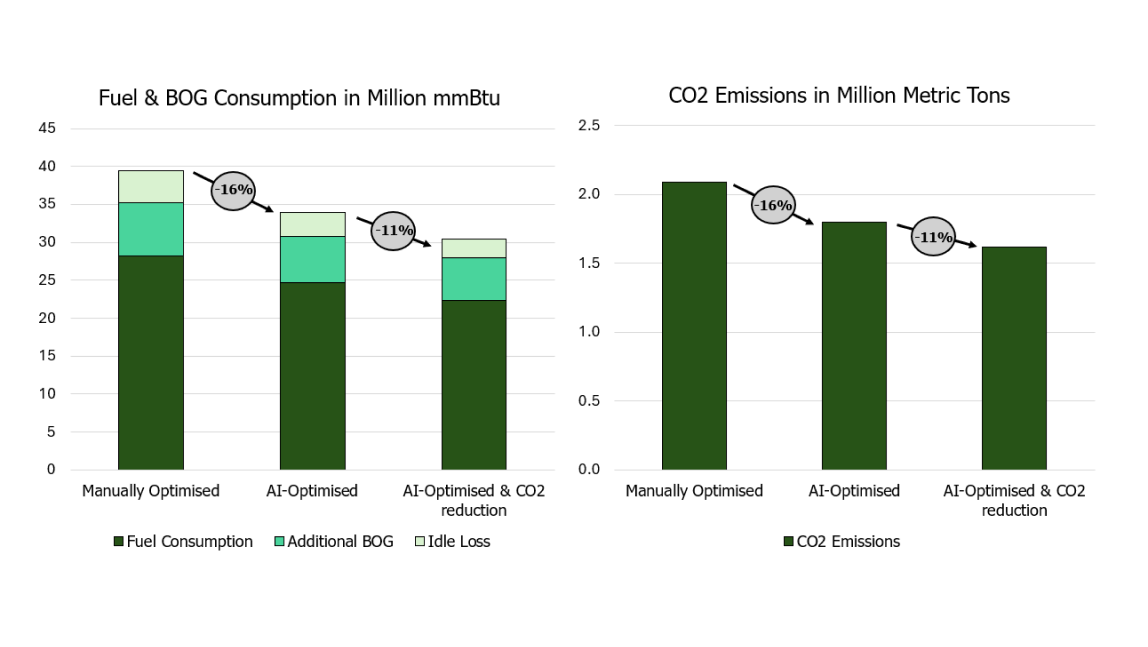Roadmaps to Net Zero using AI in LNG
Urgent Net Zero: How AI can help
To achieve the Paris Agreement's goal of limiting global warming to 1.5°C, a 45% reduction in carbon emissions by 2030 is crucial. LNG shipping adds to CO2 emissions due to fuel combustion, boil-off gas (BOG) consumption and idle loss. Advancements in AI offer a solution for decarbonising LNG shipping by optimising scheduling and operations. This case study demonstrates how effectively X-LNG can reduce CO2 emissions by optimising LNG shipping operation.


Three Levels of Optimisation
In our example, the same portfolio, which consists of 40 vessels and 200 cargos delivered across 6 months, is utilised for three levels of optimisation: manual optimisation, AI-powered optimisation and AI optimisation with CO2 reduction.
- Manual optimisation: Traditional spreadsheet-based methods met all obligations but offered only feasible, not optimal, solutions.
- AI-powered optimisation: Optimisation using AI, fulfilling all obligations while achieving route optimisation and P&L maximisation.
- AI optimisation with CO2 reduction: Optimisation using AI, fulfilling all obligations, achieving route optimisation and P&L maximisation and reducing CO₂ emissions through versatile LNG vessel routing and speed / fuel optimisation.
20 Million Tons of CO2 Could be Saved Annually
The AI-optimised case with CO2 reduction saves up to 475k tons of CO2 in six months, equating to around 1 million tons annually for 40 vessels. Scaling this to global LNG fleet of 800 vessels, up to 20 million tons of CO2 could be saved per year – equivalent to planting 800 million trees.
- Manual optimisation: ~39 M mmBtu fuel consumption, ~2.1 M tons CO₂ emissions.
- AI-powered optimisation: Enhanced profitability with 16% lower CO₂ emissions (~34 MmmBtu fuel consumption, ~1.8 M tons CO₂ emissions).
- AI optimisation with CO2 reduction: Achieved 23% lower CO₂ emissions and further reduced fuel consumption (~30 M mmBtu fuel consumption, ~1.6 M tons CO₂ emissions) At Calypso, we're balancing profitability with sustainability, driving the future of AI in LNG shipping.
Check out the full detailed analysis here

.svg)
Legal Notice
Impressum
Angaben gemäß § 5 TMG
Calypso Ventures GmbH
Bismarckstraße 10/12
10625 Berlin
Handelsregister: HRB 239736 B
Amtsgericht Charlottenburg
Umsatzsteuer: DE342781749
Vertreten durch:
Michael Schach
Kontakt
Telefon: +49 30 41734423
E-Mail: [email protected]
Nutzungsvereinbarungen
Imprint
Disclosures according to German law § 5 TMG
Calypso Ventures GmbH
Bismarckstraße 10/12
10625 Berlin
Registered number: HRB 239736 B
Amtsgericht Charlottenburg (Germany)
VAT: DE342781749
Represented by:
Michael Schach
Contact
Phone: +49 30 41734423
E-Mail: [email protected]
User Agreements
Roadmaps to Net Zero using AI in LNG

Urgent Net Zero: How AI can help
To achieve the Paris Agreement's goal of limiting global warming to 1.5°C, a 45% reduction in carbon emissions by 2030 is crucial. LNG shipping adds to CO2 emissions due to fuel combustion, boil-off gas (BOG) consumption and idle loss. Advancements in AI offer a solution for decarbonising LNG shipping by optimising scheduling and operations. This case study demonstrates how effectively X-LNG can reduce CO2 emissions by optimising LNG shipping operation.
Three Levels of Optimisation

In our example, the same portfolio, which consists of 40 vessels and 200 cargos delivered across 6 months, is utilised for three levels of optimisation: manual optimisation, AI-powered optimisation and AI optimisation with CO2 reduction.
- Manual optimisation: Traditional spreadsheet-based methods met all obligations but offered only feasible, not optimal, solutions.
- AI-powered optimisation: Optimisation using AI, fulfilling all obligations while achieving route optimisation and P&L maximisation.
- AI optimisation with CO2 reduction: Optimisation using AI, fulfilling all obligations, achieving route optimisation and P&L maximisation and reducing CO₂ emissions through versatile LNG vessel routing and speed / fuel optimisation.
20 Million Tons of CO2 Could be Saved Annually

The AI-optimised case with CO2 reduction saves up to 475k tons of CO2 in six months, equating to around 1 million tons annually for 40 vessels. Scaling this to global LNG fleet of 800 vessels, up to 20 million tons of CO2 could be saved per year – equivalent to planting 800 million trees.
- Manual optimisation: ~39 M mmBtu fuel consumption, ~2.1 M tons CO₂ emissions.
- AI-powered optimisation: Enhanced profitability with 16% lower CO₂ emissions (~34 MmmBtu fuel consumption, ~1.8 M tons CO₂ emissions).
- AI optimisation with CO2 reduction: Achieved 23% lower CO₂ emissions and further reduced fuel consumption (~30 M mmBtu fuel consumption, ~1.6 M tons CO₂ emissions) At Calypso, we're balancing profitability with sustainability, driving the future of AI in LNG shipping.
Check out the full detailed analysis here

.svg)
Legal Notice
Impressum
Angaben gemäß § 5 TMG
Calypso Ventures GmbH
Bismarckstraße 10/12
10625 Berlin
Handelsregister: HRB 239736 B
Amtsgericht Charlottenburg
Umsatzsteuer: DE342781749
Vertreten durch:
Michael Schach
Kontakt
Telefon: +49 30 41734423
E-Mail: [email protected]
Nutzungsvereinbarungen
Imprint
Disclosures according to German law § 5 TMG
Calypso Ventures GmbH
Bismarckstraße 10/12
10625 Berlin
Registered number: HRB 239736 B
Amtsgericht Charlottenburg (Germany)
VAT: DE342781749
Represented by:
Michael Schach
Contact
Phone: +49 30 41734423
E-Mail: [email protected]
User Agreements



.svg)
